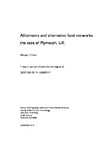Allotments and alternative food networks: the case of Plymouth, UK
| dc.contributor.supervisor | Wilson, Geoffrey | |
| dc.contributor.author | Miller, Wendy M | |
| dc.contributor.other | School of Geography, Earth and Environmental Sciences | en_US |
| dc.date.accessioned | 2014-01-30T13:20:25Z | |
| dc.date.available | 2014-01-30T13:20:25Z | |
| dc.date.issued | 2013 | |
| dc.date.issued | 2013 | |
| dc.identifier | 268489 | en_US |
| dc.identifier.uri | http://hdl.handle.net/10026.1/2874 | |
| dc.description.abstract |
Alternative food networks (AFNs) are the focus of an ‘explosive growth’ of research in Europe (Goodman 2004), and the term covers a wide range of activities, from food banks, community gardens, and farmers’ markets, to community supported or organic agriculture. However, there is an impasse in differing positions over whether AFNs represent an exclusionary place-based ‘quality turn’ (Ilbery and Kneafsey 2000), or whether they contribute to inclusive local communities, sustainability and food security (Tregear 2011, Kirwan and Maye 2013). This research aimed to clarify these debates, through exploration of UK allotments as a benchmark for AFNs, using the case of Plymouth, SW England. A political ecology perspective of social-ecological systems (Ostrom 2008) was used to investigate the activities, relations and governance involved in allotments and AFNs, organised through the concepts of multidimensional capital assets (Bebbington 1999). This research demonstrates how activities on allotments involve human, social, cultural, natural and political capital assets, encompassing both basic food security and a quality turn towards ‘good food’ (Sage 2003). Taking the long view, it is seen that the relative importance of the different asset dimensions are contingent on wider socio-political settings. Relations on allotments illustrate the building of social capital, which extends to wider communities of interest, practice and place (Harrington et al. 2008), and which involves values of social justice that can be explained as diverse or care economies (Gibson-Graham 2008, Dowler et al. 2010). However, the politics and governance of allotments are largely influenced by neoliberal policies that favour oligopolistic and transnational food systems and restrict urban land allocations for place-based food initiatives. Present-day urban population densities are at levels far higher than envisaged for the original garden cities. Nevertheless, alliances at neighbourhood, city, regional, national and transnational scales are coalescing around the values represented in the original setting up of the UK allotment system: of self-reliance, human-scale settlements and the restorative value of the natural environment. Any realization of the potential contribution of allotments and AFNs to the sustainability and resilience of food supplies for urban populations (Armitage et al. 2008, Folke et al. 2010) ultimately depends on multilevel responses to a large range of challenges. Finally, the thesis contends that, in the present day, evidence is building up around the potential of allotments and many other AFN activities, or place-based food systems, to meet multiple policy objectives through aligned values. | en_US |
| dc.language.iso | en | en_US |
| dc.publisher | University of Plymouth | en_US |
| dc.subject | Alternative Food Networks | |
| dc.subject | Political Ecology | |
| dc.subject | Capital Assets | |
| dc.subject | Sustainability | |
| dc.subject | Resilience | |
| dc.subject | Food Bank | |
| dc.subject | Plymouth | |
| dc.subject | Allotments | en_US |
| dc.title | Allotments and alternative food networks: the case of Plymouth, UK | en_US |
| dc.type | Thesis | |
| plymouth.version | Edited version | en_US |
| dc.identifier.doi | http://dx.doi.org/10.24382/3495 |
Files in this item
This item appears in the following Collection(s)
-
01 Research Theses Main Collection
Research Theses Main


